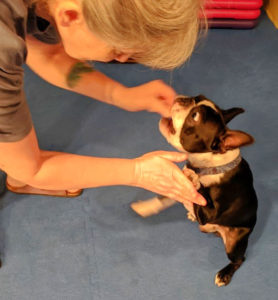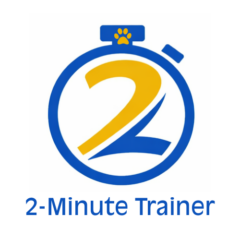If you’ve been told your dog is too hyper for training, you’ve been sold a bill of goods and should demand your money back immediately. No dog benefits more. The whole point of training is to have your dog know how to act, in public or private, regardless of how revved up they are.
Nothing about dog training should be boring, calm, tedious, or rigid. It should be fun and fast, noisy and full of laughter. Your dog should know it’s okay, even good, to get excited. Dogs are all about fun. Training games are just another way to play with them. It has the side benefit of turning them into great companions who know their boundaries and listen to their people. Even when their excitement level is through the roof.
Rev ‘em up
If you’ve ever attended or watched an agility competition, you’ve seen handlers playing tug with their dogs as they wait to go in the ring. The objective is to get their dogs excited to run. The most successful dogs are not only excited and fast, but also paying attention to their people. Dogs are capable of listening, even in a high energy state.
Some of the training games (Touch, Throw Your Dog Away) are designed to get your dog excited. When you want your dog’s most intense focus on you – play a fast, fun training game. As long as you’re part of the equation, excitement is exactly what you want.
Don’t calm down
Stop telling your dog to calm down. It doesn’t work and it isn’t going to happen. Replace that mentality with one that works. Teach your dog to channel that excitement into something that makes you both happy. While not every hyper dog is destined to be an agility, obedience, or dog sport competitor, they can all learn to channel their energy so they don’t make you crazy.
We know what we’re talking about. We have Boston Terriers. And while not every Boston is hyper, we’ve been lucky enough to have a couple (okay, all) who are. Booker, at 11 years old, is now retired. He also has multiple Obedience, Rally, and Agility titles. That didn’t happen because we trained him to be calm. He’s not capable of being calm. It happened because he learned how to channel his energy productively.
Listen through the buzz

How do you get your hyper dog to play training games? All dogs, even hyper ones, always do what’s most rewarding to them. It’s up to you to be the most interesting thing around. Up your energy level. Talk in an excited voice. Move suddenly. Run away. Engage your dog. Have incredibly high-value treats.
Getting your hyper dog to pay attention for a 2-Minute Training Game isn’t hard. Two minutes. That’s all. And concentrating hard for those two minutes will probably tire out your hyper dog for quite a while. Thinking can be exhausting. Especially when it’s a new challenge you’re asking your dog to meet.
Set limits
Just as you want your hyper dog to get excited to play with you, they need to understand there are limits. That’s where setting the timer for your 2-Minute Training games comes in. The dog will learn that the game is over when the timer goes off. Dogs like routine. They love knowing what to expect. It won’t take long for them to know that the timer’s ring means the game’s over.
Show your dog what the timer’s ring means. Say something like “That’s all!” when it goes off. And stop playing immediately. Put away the treats and the clicker. Turn off the timer and leave the training space. Even if you’re playing in the kitchen, leaving the area will reinforce the idea that game time is over.
More benefits
Enforcing a limit will also teach your dog to switch gears and reset their emotional state. Since we tend to train each of our dogs individually, in turn, the dogs who are not playing are in their crates. This helps them differentiate between playtime and relaxing time. If you can make the break between “work” time and “relax” time a physical difference, it helps the dog. Move into another room. Take a walk. Make a clear differentiation between the two modes.
Your hyper dog can’t help being that way. Exuberant, energetic dogs can be challenging. They’re also fun, affectionate, and eager to play with you. Take advantage of the traits you love. Teach them control to take care of the others.
